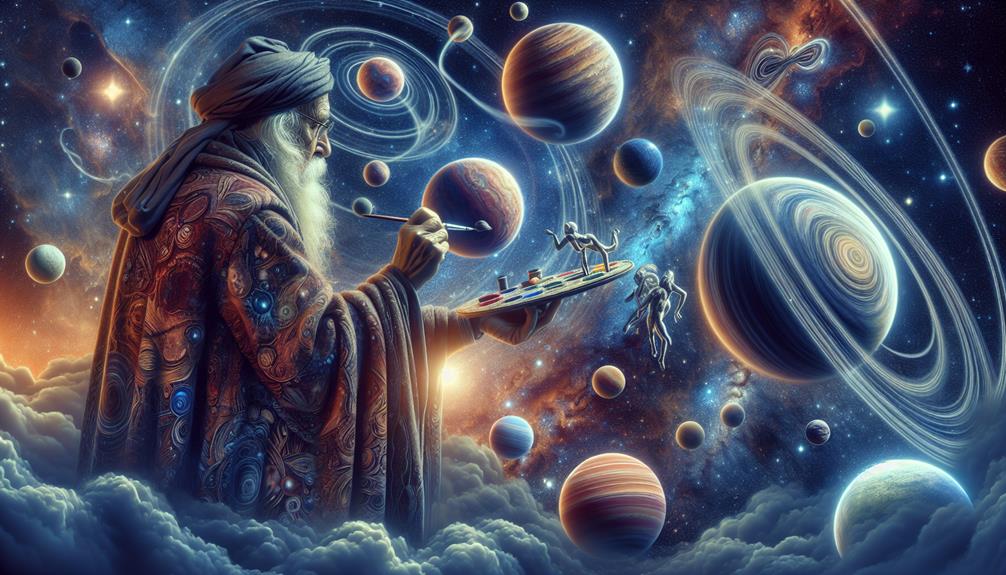Who Invented The Solar System And When
In a universe teeming with cosmic wonders, the question of who exactly invented the solar system and when it came into being remains a tantalizing enigma. As you gaze up at the night sky, its celestial bodies shimmering with ancient stories, you can't help but wonder about the origins of our own planetary home.
Who Invented The Solar System And When
Delve into the annals of history and scientific inquiry, and you'll uncover a fascinating journey of human curiosity, observation, and discovery. From the ancient cosmological beliefs that shaped early civilizations to the modern understanding of solar system formation, the quest to unveil the mysteries of our cosmic neighborhood has yielded significant breakthroughs, yet leaves us with countless unanswered questions.
Who Invented The Solar System And When
So, buckle up and prepare to embark on a captivating exploration of the birth of the solar system and the cosmic forces that brought it into existence.
Who Invented The Solar System And When
Key Takeaways
Who Invented The Solar System And When
- Ancient civilizations, such as the Egyptians, Greeks, and Chinese, had different cosmological beliefs that shaped their understanding of the solar system.
- Nicolaus Copernicus proposed the heliocentric model, placing the sun at the center of the solar system, challenging the geocentric model.
- Early observations and theories by Copernicus, Kepler, and Galileo laid the foundation for our modern understanding of the solar system.
- The modern understanding of solar system formation is based on the Nebular Hypothesis, which suggests that our solar system formed from a collapsing giant molecular cloud called a nebula.
Ancient Cosmological Beliefs
Who Invented The Solar System And When
Ancient civilizations held diverse and intriguing cosmological beliefs, shaping their understanding of the solar system. As a member of a community seeking belonging, it's fascinating to explore how these ancient cultures perceived the cosmos.
Who Invented The Solar System And When
The Egyptians, for example, believed that the sun god Ra sailed across the sky during the day and traveled through the underworld at night. They associated the movements of the sun with life and death, emphasizing the cyclical nature of existence.
Who Invented The Solar System And When
In contrast, the ancient Greeks believed that the earth was the center of the universe and that the sun, moon, and planets revolved around it. This geocentric model, proposed by philosophers like Aristotle and Ptolemy, was widely accepted for centuries.
The ancient Chinese, on the other hand, viewed the cosmos as a harmonious balance between yin and yang, with celestial bodies representing various forces and energies. Their belief in the interconnectedness of everything in the universe fostered a sense of belonging and unity with the cosmos.
These diverse cosmological beliefs influenced the way ancient civilizations interacted with the solar system, shaping their understanding of the heavens and their place within it.
Early Observations and Theories
As you explore the early observations and theories of the solar system, you'll uncover the fascinating discoveries made by astronomers throughout history. These early astronomers, driven by a deep curiosity about the world and their place in it, made significant contributions to our understanding of the solar system.
One of the earliest recorded observations of the solar system was made by the ancient Greeks. They believed that the Earth was at the center of the universe and that the other celestial bodies, including the sun, moon, and planets, revolved around it. This geocentric model, as it came to be known, was widely accepted for centuries.
However, as more accurate observations were made and new theories developed, this geocentric model was challenged. In the 16th century, Nicolaus Copernicus proposed a heliocentric model, which placed the sun at the center of the solar system. This groundbreaking theory was later supported by the observations and mathematical calculations of Johannes Kepler and Galileo Galilei.
These early observations and theories laid the groundwork for our modern understanding of the solar system. They sparked further exploration and inspired generations of astronomers to come. By studying their discoveries, we can gain a sense of connection to these early pioneers and the collective human effort to unravel the mysteries of the universe.
The Modern Understanding of Solar System Formation
Scientists have developed a modern understanding of solar system formation based on extensive research and evidence. Here is what we know:
- The Nebular Hypothesis: Scientists believe that our solar system formed from a giant molecular cloud called a nebula. This cloud consisted of gas and dust, which began to collapse under its own gravity. As it collapsed, it started spinning faster, forming a spinning disk shape. The center of the disk eventually became our Sun, while the remaining material formed the planets, moons, and other celestial bodies.
- Accretion: Within the spinning disk, small particles of dust and gas collided and stuck together, forming larger objects called planetesimals. Over time, these planetesimals continued to collide and grow, eventually becoming planets. The process of accretion played a crucial role in the formation of our solar system.
- Late Heavy Bombardment: After the planets formed, the solar system experienced a period of intense bombardment known as the Late Heavy Bombardment. During this time, leftover planetesimals and other debris from the formation process bombarded the planets, causing significant cratering and shaping their surfaces.
Understanding the formation of our solar system provides a sense of belonging and connection to the universe. It allows us to appreciate the intricate processes that led to the creation of our home in space.
Significant Discoveries and Breakthroughs
Throughout history, numerous groundbreaking discoveries and breakthroughs have revolutionized our understanding of the solar system. These significant advancements have provided us with a sense of belonging, as we continue to unravel the mysteries of our cosmic neighborhood.
One of the most significant discoveries was made by Nicolaus Copernicus in the 16th century. He proposed the heliocentric model, which suggested that the Sun, rather than the Earth, was at the center of the solar system. This revolutionary idea challenged the prevailing belief of geocentrism and paved the way for further scientific exploration.
In the 17th century, Galileo Galilei made crucial observations using his newly invented telescope. He discovered four of Jupiter's moons, providing evidence that celestial bodies could orbit something other than Earth. Galileo's observations supported Copernicus' heliocentric model and expanded our understanding of the solar system.
In the 18th and 19th centuries, astronomers like William Herschel and Johannes Kepler made significant breakthroughs in understanding planetary motion and the formation of the solar system. Herschel discovered Uranus, while Kepler's laws of planetary motion laid the foundation for our understanding of how planets orbit the Sun.
In the 20th century, breakthroughs in space exploration allowed us to witness the solar system like never before. The Voyager missions provided stunning images and data about the outer planets, while the Hubble Space Telescope revealed the vastness and beauty of the cosmos.
These significant discoveries and breakthroughs have shaped our understanding of the solar system, fostering a sense of belonging as we explore the wonders of our celestial neighborhood.
Unanswered Questions and Future Research Directions
After exploring the significant discoveries and breakthroughs that have revolutionized our understanding of the solar system, it's now time to address the unanswered questions and future research directions that lie ahead. As members of a society that seeks belonging and desires to unravel the mysteries of our cosmic neighborhood, we find ourselves eager to delve deeper into the unknown.
Here are three key areas that remain open for exploration:
- Origins of the Solar System: Despite our progress, the precise mechanisms that led to the formation of the solar system still elude us. Scientists continue to investigate the role of protoplanetary disks, the influence of stellar nurseries, and the formation of planetary embryos. By studying these processes, we hope to gain a clearer understanding of how our own solar system came into existence.
- Search for Extraterrestrial Life: The quest for extraterrestrial life has captivated our imaginations for centuries. While we've made strides in identifying habitable environments and detecting potential biosignatures, we've yet to find conclusive evidence of life beyond Earth. Future research will focus on exploring promising candidates, such as Mars, Europa, and Enceladus, as well as developing more advanced techniques for detecting signs of life.
- Understanding Planetary Dynamics: The dynamics of our solar system, including the movements of planets, asteroids, and comets, remain a fascinating field of study. Unanswered questions persist regarding the evolution of planetary orbits, the origins of asteroid belts, and the mechanisms behind planetary migrations. Ongoing research aims to unravel these mysteries and further our understanding of the intricate dance of celestial bodies.
As we continue to explore the solar system, our collective pursuit of knowledge and our desire for a sense of belonging propel us forward. With each unanswered question, we're driven to push the boundaries of our understanding, ultimately bringing us closer to unraveling the secrets of our cosmic home.
Frequently Asked Questions
How Did Ancient Civilizations Explain the Movement of the Planets in the Solar System?
Ancient civilizations explained the movement of the planets in the solar system by attributing it to the gods. They believed that the gods controlled the celestial bodies and used them to communicate with humanity.
What Were Some of the Early Theories on the Formation of the Solar System?
Imagine a time when scholars pondered the birth of our solar system. They proposed theories, suggesting it formed from a swirling cloud of gas and dust. These early ideas laid the foundation for our understanding today.
How Has Our Understanding of the Solar System Formation Evolved Over Time?
Over time, your understanding of solar system formation has evolved. Scientists have developed theories based on evidence, such as the nebular hypothesis, which suggests that the solar system formed from a giant cloud of gas and dust.
What Are Some Significant Discoveries That Have Contributed to Our Current Understanding of the Solar System?
Some significant discoveries that have contributed to our current understanding of the solar system include the detection of exoplanets, the discovery of water on Mars, and the exploration of Saturn's moon, Enceladus.
What Are the Current Unanswered Questions in Solar System Research and What Are the Future Research Directions in This Field?
What are the current unanswered questions in solar system research and what are the future research directions in this field? Well, there's still so much we don't know. Scientists are eager to explore new planets, understand the origins of life, and unravel the mysteries of dark matter. Exciting times ahead!
Conclusion
You've journeyed through the vast expanse of time and knowledge, exploring the origins of our solar system. Like a cosmic dance, ancient beliefs, early observations, and modern understanding have woven together to unravel its mysteries.
But even with significant discoveries and breakthroughs, there are still unanswered questions that beckon future research.
The solar system, like a dazzling tapestry, continues to captivate and inspire our imagination, reminding us of the wonders that await us in the boundless reaches of the universe.

